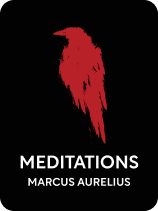

This article is an excerpt from the Shortform book guide to "Meditations" by Marcus Aurelius. Shortform has the world's best summaries and analyses of books you should be reading.
Like this article? Sign up for a free trial here .
Is Stoicism relevant to modern life? How do Stoics view the world? Can anyone cultivate a stoic mindset?
Stoicism began in ancient times, but its lessons are as relevant today as they were at the times of Zino of Citium, the founder of the Stoic school of thought. The stoic way of life, at its root, centers around looking at the world through the lens of logic and rationality and keeping a dispassionate attitude to extreme emotions.
Here are four principles to keep in mind if you’d like to try the stoic way of life.
What Is Stoicism?
Stoicism is a life philosophy that emphasizes agency, mental toughness, and self-discipline as tools for living a good life. The stoic way of life, thus, centers around cultivating these qualities. Here are four principles that can help you develop a stoic outlook.
1) See Things as They Are
You should always be able to identify and define whatever you encounter—every object, person, and situation. Your definitions should be reasonable and accurate, not based on emotional reactions or illogical superstitions.
Furthermore, you should know what parts go into making the thing in question, what its purpose is, and how you should deal with it (or if you even need to). Finally, you should know what brought you into contact with this thing: for example, the will of the gods, random chance, or the actions of another person.
In other words, before you react to anything, make certain that you understand it clearly. Always proceed with logic, not emotion.
2) Understand Yourself
You can even apply the principle of seeing things as they are to yourself and so come to understand yourself better. You’re made of flesh, spirit, and intelligence. These are the things that come together to give you life, and when you die they merely separate again, with no harm done to any of them.
Of those three elements, the flesh is by far the least important. You shouldn’t concern yourself with your physical body, which is nothing more than a messy tangle of blood and bone. Your body is just a vessel, and you’ll throw it away when you’re done with it.
The Stoics call spirit pneuma, and it’s considered to be the “breath of life.” Put simply, spirit is the force that animates you. However, although necessary, spirit is really nothing but air; and never the same air twice. You endlessly recycle your spirit as you inhale and exhale.
Intelligence, however, is by far the most important element of these three: You’re ruled by your intelligence. In the end, the mind is all that matters—your mind is what you really are.
3) Remember That You’ll Die
You could die at any moment. That thought should guide your actions every day. You should consider how long you’ve been putting off the things you mean to do, and realize that your time to do those things is quickly running out.
Approach every task as if it’s the last thing you’ll ever do and the final thing you’ll be remembered for. Spend every minute focused on what’s in front of you, doing your work with sincerity and care.
To remain focused, avoid distractions and throw away possessions that might distract you. For example, if someone finds himself drawn to frivolous books for entertainment, he should get rid of those books so he won’t be tempted by them.
If you find yourself getting constantly distracted, make time to learn new things and enrich your life, rather than letting yourself get pulled every which way by passing fancies. People who work without focus, who have no direction in life, are wasting their time even when working.
Therefore, you must discipline your mind. Be in the habit of examining your thoughts and weeding out anything irrelevant to the task at hand. Additionally, always rid yourself of any thoughts that are selfish or malicious. Your thoughts should be so straightforward and selfless that if someone asks what you’re thinking about, you can answer immediately and honestly.
Finally, a major distraction that everyone should forego is worrying about what others think or do. Examining other people is a waste of time and energy and will only bring you grief. Instead, mind your own business and focus on yourself. The one exception to this is when you’re concerned about other people for the common good—for example, you should be concerned if someone’s behaving recklessly and endangering those around them.
4) Decide How You’ll Live Your Life
Consider the question: Will you follow logos, or do something else with your life? Make your decision clearly. Make that decision only once, and stick to it for life. Anything else is a waste of your limited time.
Someone who lives by logos doesn’t get swept away by pleasure or pain. He has no concern for what others do or think. He keeps his composure no matter what happens to him, because he knows that worrying is both unnecessary and unhelpful.
If you find something better than living by this rational logic—the logic that drives you to honesty, discipline, courage, and justice—then it must be something really extraordinary. Embrace that better thing fully.
However, if you can’t find something more important or more meaningful than logos, then there should be no room in your life for anything but logos.

———End of Preview———
Like what you just read? Read the rest of the world's best book summary and analysis of Marcus Aurelius's "Meditations" at Shortform .
Here's what you'll find in our full Meditations summary :
- Marcus Aurelius' teachings on Stoicism
- How rational thinking can guide you through any hardship and allow you to endure any pain
- Why you should be motivated by death rather than afraid of it






